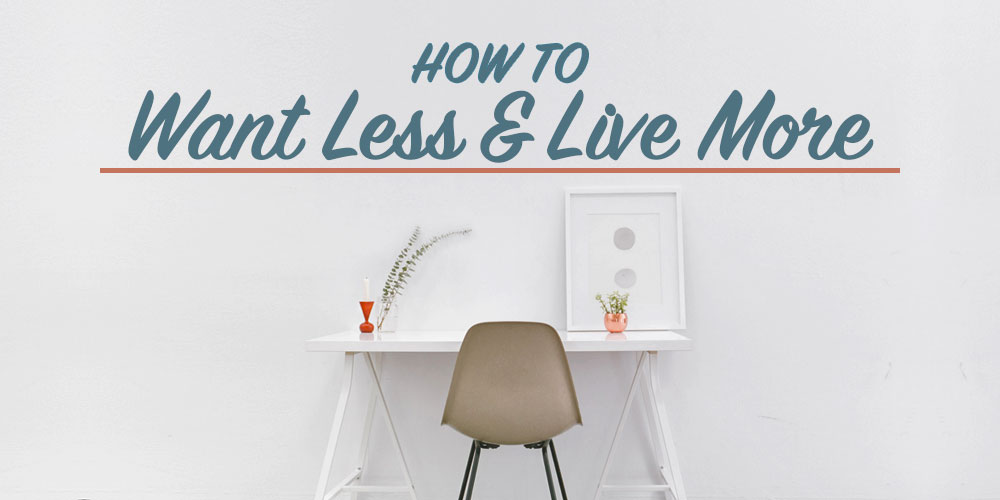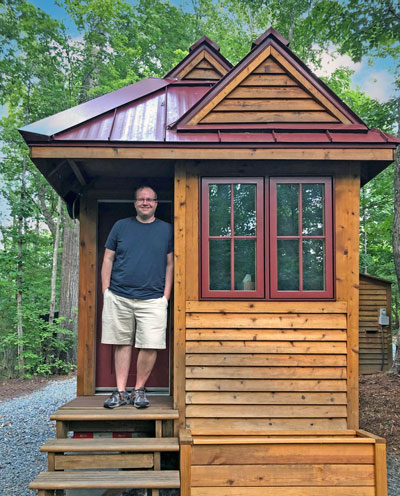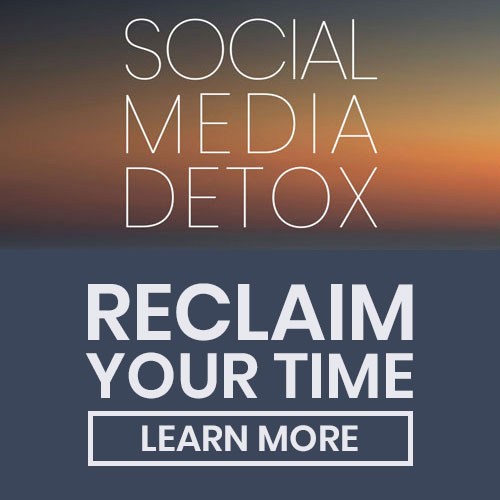
NAVIGATION
The concept of wanting less just isn’t our societal default, so sometimes it takes intentional work to be happy with what you have. However, when you put in the work to change your mindset, your satisfaction actually becomes disconnected from what you own and changes your life for the better.

Hi, I’m Ryan
As a dedicated minimalist, I’ve put in a lot of work over the years to train myself to want less and be content with what I have. Ironically, the more I train myself to want less, the more satisfied I actually feel.

Why Do We Fall Into The Trap Of Wanting More?

It’s not easy to want less. However, becoming a minimalist and putting in the work to be content with what I already have has given me an immense amount of power. Minimalism helps me resist the forces that are constantly trying to convince me that I don’t have enough, do enough, or am not enough.

Our Economy Teaches Us To Always Want More
It’s hard to stop wanting things in a society that constantly mirrors our discontentment back to us. At the end of the day, satisfaction isn’t good for business. The best way to get people to spend money is to convince them of a lack or gap in their life.
 There are paid marketing professionals working hard to prey on our insecurities and perceived insufficiencies, to convince us that we do not have enough, or worse, that we are not enough in our looks, lifestyles, or identities.
There are paid marketing professionals working hard to prey on our insecurities and perceived insufficiencies, to convince us that we do not have enough, or worse, that we are not enough in our looks, lifestyles, or identities.
To make matters even worse, updated technology not only allows marketers to feed our insecurities, but to tailor the advertisements we receive to them. It’s a perfect storm, and we easily fall into the trap of wanting for more, with so many strategic forces in place to convince us of exactly that.
The minimalist life philosophy is a wise way to ignore those cues. It takes intentional effort through minimalist practices to take time away from our phones and the media to remove the signals coaxing us to buy more.
Comparing Ourselves To Others Makes Us Want More
It’s hard not to compare ourselves with others with an ever-present pressure to keep up with the Joneses. One of the most powerful tools you can muster to combat that comparison is contentment with what you have. Easier said than done, right?
 At the end of the day, if you are able to feel confident in what you already have and what you already are, then the successes of others, the huge, gorgeous house that your friends have, and the really cool outfits that your old college pals are always showing off on Instagram won’t bother you.
At the end of the day, if you are able to feel confident in what you already have and what you already are, then the successes of others, the huge, gorgeous house that your friends have, and the really cool outfits that your old college pals are always showing off on Instagram won’t bother you.
Again, this kind of confidence and satisfaction isn’t something that will appear overnight. It’s hard to train our minds to see the successes or gains of others and not think, “I need that too.” Confidence and inner satisfaction are a lifelong pursuit.
Lack Of Presence Keeps Us Always Wanting More
Allowing our minds to drift too far into the “what ifs” can increase anxiety and trick us into an endless loop of always wanting more. This can happen through the influence of the people around us or of social media.
 It’s easy to fall into the trap of believing that if we could just finally get that new house, car, fancy outfit, or upgraded phone, then we will finally feel satisfied.
It’s easy to fall into the trap of believing that if we could just finally get that new house, car, fancy outfit, or upgraded phone, then we will finally feel satisfied.
When we focus so much on wanting specific things in the future, we lose sight of what we already have in the present moment. Minimalism tackles this and encourages us to be exactly where we are.
There is no harm in dreaming, planning, or wishing for good and prosperous things to come in the future. However, when we put all of our eggs in material baskets, it’s impossible to stop wanting more and craving the next best thing.
It takes active, intentional work within minimalist thinking to remain centered in the present moment and find true satisfaction in what you have in the here and now.
Achievement Culture Keeps Us From Wanting Less
We live in a society that places lots of value in climbing up the ladder to success and always looking toward the next best thing in the workplace. There’s the pervading idea that if we aren’t trying to get a promotion or aren’t chasing toward a new career goal, then we aren’t doing things the right way.
 This very mentality is another reason that we are always wanting more. It’s ingrained in us to look upwards at what we could become and pine after that. This narrative keeps you from feeling fully satisfied with exactly what you have, where you are.
This very mentality is another reason that we are always wanting more. It’s ingrained in us to look upwards at what we could become and pine after that. This narrative keeps you from feeling fully satisfied with exactly what you have, where you are.
Diving into a minimalist lifestyle and intentionally challenging achievement culture is one way to work on being satisfied with less. Being content where you are does not mean you are lazy or aren’t investing in yourself, your work, and your life.
Don’t listen to anyone who tells you that the only metric for growth is advancement in the workplace. It is a powerful thing to be able to say to yourself and others that you aren’t actually hyper fixated on the ways you can climb up any kind of ladder, but instead that you are deeply content with the position you hold, the work that you do, and the person you are in the present.
How To Want Less: Tangible Advice To Stop Wanting Things

When thinking through tangible steps we can use to overcome the desire to always want more, there are several strategies that immediately come to mind. I’ve spent a lot of time over the years intentionally thinking through the ways that I can learn to want less and be content with what I have now.
Want Less By Identifying The Purpose Of Each Desire
If you think you need new makeup in order to feel beautiful, maybe you can find other ways to enhance your natural beauty with supplies you already own.
If you think you need to renovate your house in order to make it look good, consider rearranging the furniture to give your space a fresh, new look without buying anything new.

Use The Five Whys Method To Want Less
One of the best ways to identify the purpose of your desires is by honing in on the five whys. The Five Whys method is one of my personal favorite methodologies to actively practice wanting less.
The way the method works is, when you feel you need something new in order to feel happy or whole, you ask yourself five different why questions in order to pin down exactly what value or feeling you are trying to gain by adding the item into your life.
Example Of The Five Why Method
Initial Desire: I want the new iPhone as soon as it comes out!
- Question: Why do you want the new iPhone? Answer: It has the highest quality camera.
- Question: Why do you want the highest quality camera? Answer: To take high caliber Instagram photos.
- Question: Why do you want to take high caliber Instagram photos? Answer: To receive likes from my friends and family.
- Question: Why do you want to receive Instagram likes? Answer: When I receive likes, I feel more confident and loved.
- Question: Do you truly need an iPhone to feel confident and loved? Answer: I can find other ways to feel confident and loved.
Applying this kind of analytical reasoning to my own desires has helped me rework my relationship with material possessions. It has encouraged me to want for less in my daily life.
Slow The Buying Process To Help You Stop Wanting Things
Another savvy method to use when training yourself to stop wanting things is to slow down the buying process and reduce how often you give into instant gratification. Whenever you get the impulse to buy something immediately, teach yourself to hesitate and buy it later on instead.
 Oftentimes, when we want something desperately in the moment, we often realize later that we didn’t actually want it as much as we thought. I used this trick often when I was trying out my no spend year. When I would be overcome with an I-have-to-have-that-now feeling, I’d take a step back and write down the item on a list.
Oftentimes, when we want something desperately in the moment, we often realize later that we didn’t actually want it as much as we thought. I used this trick often when I was trying out my no spend year. When I would be overcome with an I-have-to-have-that-now feeling, I’d take a step back and write down the item on a list.
Usually, when I would come back to my list later on, I realized I didn’t actually want the item as much as I once thought I did. Waiting to make the purchase made it easier to move on.
Want Less By Actively Practicing Gratitude
The absolute best way to want less is to intentionally practice gratitude every single day. It may sound cheesy at first, but taking time out of every day to make note of your blessings and the things you’re thankful for makes it easier to be content with what you have.
If you’re the journaling type, you might want to actually take time during your morning or nightly routine to list off the things that you are grateful for. If that’s not really your thing, just take a quick five minutes out of your day to think through specific things you consider blessings. It’s wild how much of a difference doing this actually makes.
The Revolutionary Power Of Wanting Less

In my own life, I have truly found that practicing these ideals of gratitude and general complacency without always looking for the next best thing has served me better than any other mentality. The idea that what we have is enough teaches us to let go of the anxious mentality that we constantly need to acquire the next best thing to be content.

Your Turn!
- Why do you personally feel trapped by wanting more?
- What strategies can you use in your life to want less?




Leave a Reply